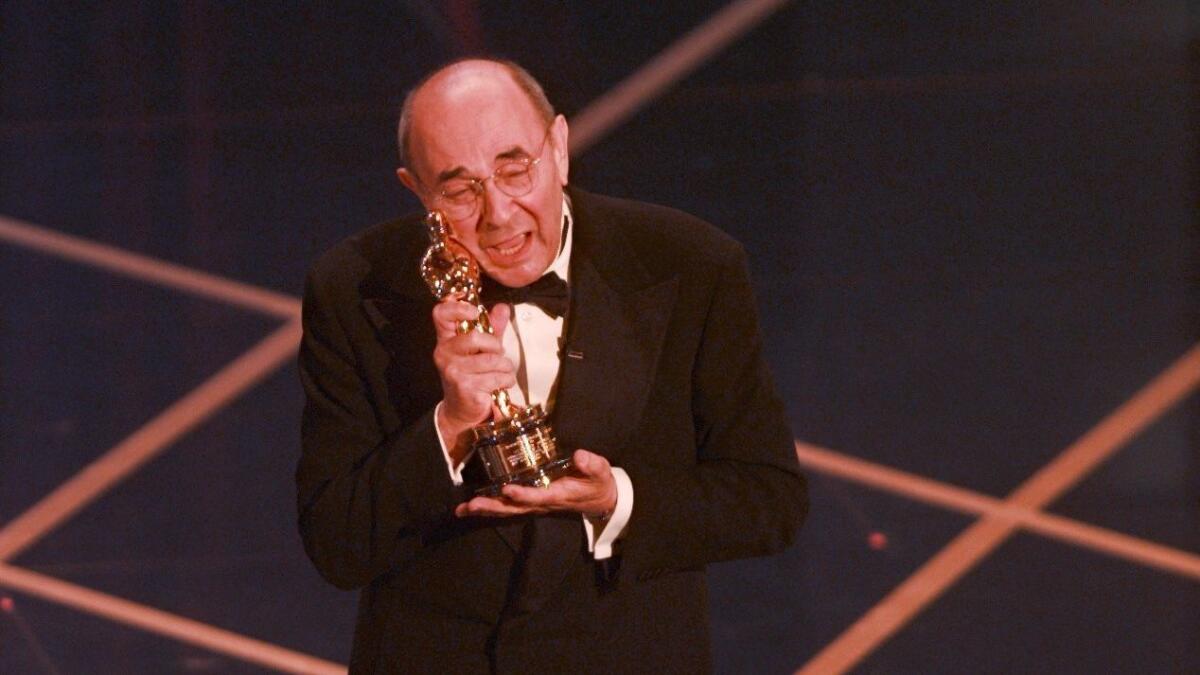From the archives: Stanley Donen made film sing but never got an Oscar nomination

- Share via
Editor’s Note: Stanley Donen, co-director with Gene Kelly of “Singin’ in the Rain” and “On the Town,” and director of “Funny Face,” “Seven Brides for Seven Brothers” and many more classic films, died Thursday at age 94. On July 2, 2006, Susan King talked with film historians and experts about Donen, who was then being honored at a Los Angeles County Museum of Art tribute, and noted that Donen was never nominated for a directing Oscar, though he was given an honorary Oscar in 1998.
------------
Several of director Stanley Donen’s movies are not only classics, but are considered flawless representatives of their genres — musicals such as 1952’s “Singin’ in the Rain,” which he co-directed with star Gene Kelly; 1954’s “Seven Brides for Seven Brothers” and 1957’s “Funny Face”; the 1958 comedy “Indiscreet”; the 1963 romantic thriller “Charade”; and the 1967 romantic drama “Two for the Road.”
Though the 82-year-old filmmaker received five Directors Guild of America nominations for his work, he failed to get an Oscar nomination. But in 1998, he received an honorary award from the motion picture academy “in appreciation of a body of work marked by grace, elegance, wit and visual innovation.”
And as if in a scene out of one of his movies, Donen broke into a song-and-dance routine during his acceptance speech, performing “Cheek to Cheek” while clutching his Oscar. He told the star-studded audience that the secret to being a great director was to “show up — and stay the hell out of the way. But you gotta show up or else you can’t take the credit and win one of these guys.”
MORE: Stanley Donen, director of ‘Singin’ in the Rain,’ dies at 94 »

“His films were so good,” says film historian and Turner Classic Movies host Robert Osborne. “They were well-written. He had wonderful actors in them and if you have all of those components put together, they really fly.”
Several of Donen’s most acclaimed films will be shown at the Los Angeles County Museum of Art’s tribute “Bedazzling! The Musicals and Comedies of Stanley Donen.” The three-weekend festival begins Friday with “Singin’ in the Rain,” the exuberant musical comedy set at the end of the silent era in Hollywood that’s considered one of the greatest movie musicals. The second feature is another energetic, witty musical comedy, 1978’s “Movie Movie,” which spoofs two film genres of the 1930s — the boxing picture and the Busby Berkeley musical.
“The only one I could compare him to would be Howard Hawks, who also worked in different genres,” says Osborne. “Stanley Donen’s output is so interesting. He did such wonderful things with Gene Kelly, but Gene Kelly gets most of the credit for those. I love Gene Kelly in all ways, but you look at the things Gene Kelly did on his own, they don’t hold a candle to the freshness of the films he made with Stanley Donen. I think Stanley never quite got credit for that.”
Osborne believes Donen’s work went unnoticed because “a lot of the things Stanley did were done at a time when people were realizing how great John Ford was and King Vidor and some of the giants who were still around to talk about their films. I think so much focus went to those guys at that point that they weren’t paying attention to what Stanley Donen did.”
Donen left his home in Columbia, S.C., at 16 to pursue a career on Broadway. He quickly landed a job as a chorus boy in George Abbott’s 1940 production of “Pal Joey,” which starred Kelly.
The two young performers became fast friends and collaborators. When Kelly was hired to choreograph Abbott’s 1941 production of “Best Foot Forward,” Donen became his assistant. Donen went on to work with Kelly in Hollywood on such films as “Cover Girl” and “Anchors Aweigh.”
Finally, in 1949, the two directed the imaginative and joyful “On the Town,” the first musical shot on location in New York. The collaboration ended rather bitterly with the dark 1955 musical comedy “It’s Always Fair Weather.”
By then, Donen had established himself as a solo director. His 1951 “Royal Wedding” had featured the seminal Fred Astaire number in which he dances on the ceiling, and “Seven Brides for Seven Brothers,” featuring lively, acrobatic musical numbers choreographed by Michael Kidd, had been nominated for an Academy Award for best film.
Leaving MGM, Donen went to Paramount to direct “Funny Face” with Astaire and Audrey Hepburn, and to Warner Bros. for 1957’s “The Pajama Game” and 1958’s “Damn Yankees,” which he co-directed with Abbott. Several films he made in Europe — “Indiscreet,” “Charade,” “Two for the Road” and the wacky 1967 updating of the Faust tale “Bedazzled,” with Peter Cook and Dudley Moore — were also critical and commercial successes.
Not only did he work with major Hollywood stars, Donen attracted some of the best screenwriters working, including Betty Comden and Adolph Green, Peter Stone and Frederic Raphael.
“His films had a great vitality and a life to them,” says Osborne. “I don’t think Donen got credit for that. I think the genius of him really is the fact that he could do so many different genres as well.
“I guess this is a kind of heresy, but if you go to a Hitchcock festival, after a while, there is a sameness to all the greatness of him in his films,” says Osborne. “With Stanley Donen, if you have a festival, every film is different....”
The sophistication and charm of Donen’s films, says Osborne, are “really lacking on the screen today. There are so many adults who have the money and the time to go to the movies and they can’t find a film that talks up to them. Stanley Donen’s films really hold up well and could be enjoyed on so many different levels.”
Save for “Movie Movie,” Donen’s films failed to connect with critics and audiences in the 1970s and ‘80s.
“I don’t think Stanley Donen changed,” Osborne says. “I think the world changed and the industry changed. How wonderful if we had Stanley Donen working today.”
Though the New York-based Donen will not be attending the festival, “Damn Yankees” star Tab Hunter will be on hand to autograph his autobiography and discuss his work in the musical.
“Stanley was just terrific,” recalls Hunter. “I think he was there to give George [Abbott] the security he needed for the film. George was very mechanical and stiff. I liked Stanley very much as a director and he was such a gentleman to boot.”
See the most-read stories in Entertainment this hour »
More to Read
Only good movies
Get the Indie Focus newsletter, Mark Olsen's weekly guide to the world of cinema.
You may occasionally receive promotional content from the Los Angeles Times.











